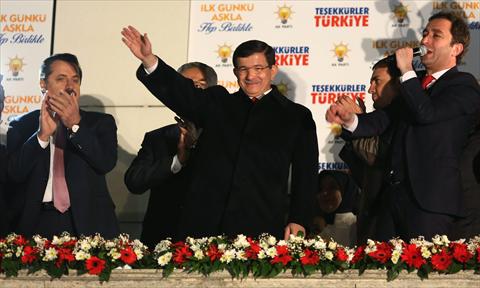

Ankara: Turkey's long-dominant Justice and Development Party (AKP) scored a stunning electoral comeback on Sunday, regaining its parliamentary majority in a poll seen as pivotal for the future of the troubled country.
The party founded by President Recep Tayyip Erdogan won 49.4 percent of the vote to secure 316 seats in the 550-member parliament with nearly all votes counted, easily enough to form a government on its own.
"Today is a day of victory," a beaming Prime Minister Ahmet Davutoglu told a crowd of jubilant supporters in his hometown.
He appealed for unity in the country, destabilised by renewed Kurdish violence and bloody jihadist attacks and facing escalating concerns about the faltering economy and what critics say is Erdogan's authoritarian rule.
"Today there are no losers but winners," he said. "We are coming to rebuild a new Turkey along with each and every citizen."
The outcome was a shock to many as opinion polls had predicted a replay of the June election when the AKP won only 40 percent of the vote and lost its majority for the first time in 13 years.
The result is a huge personal victory for 61-year-old Erdogan, Turkey's divisive strongman who may now be able to secure enough support for his controversial ambitions to expand his role into a powerful US-style executive presidency.
Kurdish conflict a key challenge
Analysts said it appeared voters had turned away from nationalist and Kurdish parties.
"Erdogan rode the wave of violence back to power," said Aykan Erdemir of the Washington-based Foundation for Defense of Democracies (FDD) and a former Turkish opposition MP.
Underscoring one of the key challenges ahead for a new AKP administration -- the state of the Kurdish peace process -- clashes erupted briefly between police and protesters in the main Kurdish city of Diyarbakir.
During the election campaign, Erdogan declared that only he and his loyal Prime Minister Ahmet Davutoglu could guarantee security, criss-crossing the country with the message: "It's me or chaos."
A report by the Brookings Institution think-tank had warned that whatever the outcome, "the challenges facing Turkey are growing by the day".
It highlighted the Kurdish crisis along with the parlous state of the economy and the fallout from the conflict in neighbouring Syria as the most urgent issues.
The political landscape has changed dramatically in Turkey since June, with the country even more divided along ethnic and sectarian lines.
HDP scrapes in
Many Turks are fearful of a return to all-out war with outlawed Kurdistan Workers' Party (PKK) rebels after fresh violence shattered a 2013 truce in July, just a month after a pro-Kurdish party won seats for the first time and denied Erdogan's AKP a majority.
The threat of further jihadist violence also overshadowed the poll after a string of attacks blamed on the Islamic State group, including twin suicide bombings on an Ankara peace rally last month that killed 102 people -- the bloodiest in Turkey's modern history.
This time round, the pro-Kurdish People's Democratic Party (HDP), led by charismatic lawyer Selahattin Demirtas, lost support but appeared to have scraped over the 10-percent threshold to stay in parliament.
Demirtas said it was not a "fair election" after his party halted campaigning in the wake of the IS attacks that targeted pro-Kurdish activists.
"But it's still a big victory, we have lost one million votes but we have stood tall against this policy of massacres and fascism," he said.
He also vowed to pursue the faltering push for peace between Ankara and PKK rebels.
"We will not back down on our stance for the need for a new constitution and for the peace process," he said at a press conference in Ankara.
The main opposition Republican People's Party (CHP) scored about 25.4 percent of the vote, similar to its June result.
Support for the Nationalist Movement Party (MHP) fell to just under 12 percent, with commentators suggesting its voters shifted to the AKP.
The IS attacks have drawn Turkey even further into the quagmire in neighbouring Syria as it struggled with the burden of more than two million refugees and found itself at odds with its NATO allies over the conflict.
After long supporting rebels fighting the Damascus regime, Ankara was cajoled into joining the US-led coalition against the IS group and launched its own "war on terrorism" targeting the jihadists as well as PKK fighters and even US-backed Syrian Kurds.
Turkey's 'big master
Erdogan, dubbed the "big master" or "Sultan" who has dominated Turkey's political scene for more than a decade, is revered and reviled in equal measure.
He was hailed in the West for creating what was once regarded as a model Muslim democracy but is now accused of blatantly cracking down on opponents and critical media.
Opponents fear that if he succeeds in expanding his powers, it would mean fewer checks and balances in a country that has long aspired to join the EU.
Turkey's economy is also in trouble, with growth slowing sharply from the dizzy heights of five years ago, unemployment rising and the Turkish lira plunging more than 25 percent in value this year.
"I'm very sorry but the results mean that the people are comfortable with the current situation," said 22-year-old law student Sevim.
"People get the governments they deserve. So we got what we deserve."
AFP




